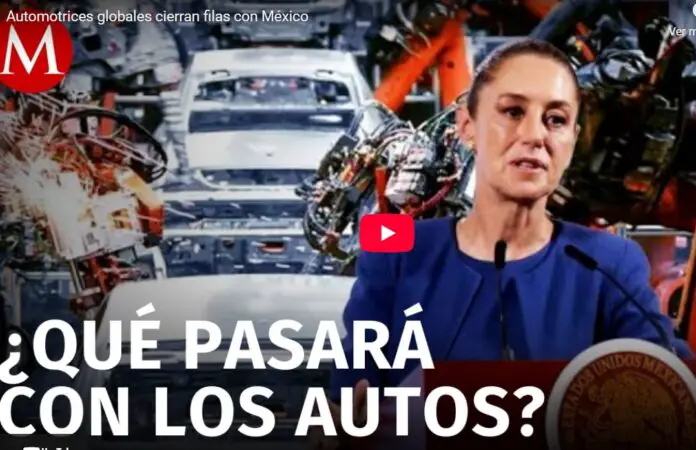More than 25 international automakers with plants in Mexico have joined forces with the Mexican government over the US imposition of 25 percent tariffs on their industry, which they argue undermines 30 years of regional integration, with NAFTA and now with the USMCA.
“The tariffs significantly harm the industry, as they affect American consumers, investment, and employment in all three countries,” say three associations, which include brands such as VW, Ford, General Motors, Honda, and Hyundai, among others.
Meanwhile, President Claudia Sheinbaum and Economy Secretary Marcelo Ebrard said they are negotiating preferential tariffs with the US so that any goods manufactured in the country are more profitable than those made in Germany, Japan, or Korea.
Sheinbaum indicated that in her last conversation with US President Donald Trump, she achieved tariff-free status for products included in the Free Trade Agreement with the US and Canada (USMCA): “The more Rules of Origin there are for products exported to the US, including those manufactured in Mexico, the better, because more products will be manufactured in Mexico, generating more jobs and more wealth for distribution.”
Ebrard stated: “What we seek is for products made in Mexico to have a better price than any other country that exports to the US. That is the preference system the president has requested.”
During the morning press conference, the President made it clear that the condition for reducing tariffs on products included in the USMCA is that 75 percent of their components and manufacturing be from the US, Canada, or Mexico.
“The answer after April 2nd is not only how we will respond to the US, which is important, but how we consolidate Plan Mexico, which will allow us to grow, create jobs, and distribute wealth, which is one of the goals for reducing poverty,” the president reiterated.
Union Position
Almost 24 hours after Trump announced the tariffs, the more than 25 automakers affiliated with the Mexican Association of the Automotive Industry (AMIA), along with the National Association of the Auto Parts Industry (INA) and the Mexican Association of Auto Parts Distributors (AMDA), stated their joint position, considering that the tariffs “undermine 30 years of integration.”
“The tariffs imposed by the US on vehicles and auto parts harm the North American automotive industry, as they directly affect American consumers, as well as investment and employment in all three countries,” they stated.
They explained that North America must be strengthened, not weakened, and therefore maintain close coordination with their counterparts in the U.S. and Canada, with whom they share a commitment to preserving the region’s competitiveness and integration.
They expressed their support for the Mexican government in the negotiations to safeguard the interests of the Mexican industry and the millions of jobs that depend on it.
For its part, the Mexican Employers’ Confederation (Coparmex) pointed out that these taxes will increase costs for Americans, which will translate into lower demand and affect the stability of the sector.
“We cannot depend on the will of a single country (…) it is urgent to strengthen the domestic market and diversify exports to reduce vulnerability to protectionist measures,” the organization stated.
Moving GM to the US is not feasible
The National Independent Union of Automotive Industry Workers said that the economic and logistical challenges that General Motors (GM) would face if it decided to move its operations to the US are not feasible, reported Alejandra Morales Reynoso, general secretary.
“It’s a huge complex; it has too many facilities to move everything immediately. The cost it would generate for GM would be in the millions.”
“In addition to this, the labor we have here in Mexico is unfortunately very cheap compared to that in the US; they would have to pay five times more than what they pay here,” he said.
Bajío, already in effect
Gabriel Padilla Maya, general director of the INA, explained that the tariffs will cause a 2.5 percent drop in the country’s auto parts sector, coupled with a decrease in exports.
“We are sustaining production growth that could reach $127 billion; with these tariff measures, if the increase was projected at 3.5 percent, the drop will be 2.5 percent; we will still be able to grow, because demand remains.”
The tanning industry in Guanajuato will also see a 35 percent drop in production of automotive leather.
Vicente Laud Martínez, president of the state Chamber of the Tannery Industry, mentioned that, despite the uncertainty, action must be taken with authorities at all three levels of government to keep automotive-related industries afloat.
“We’re down 35 percent (…) The tariffs are going to hit us hard, but we have the means to reverse the impact that could come in volume,” he said.
He explained that the difficult situation is global, as leather was worth $100 10 years ago, and is currently only $30. “The drop in demand is that significant, which has caused the price of leather to fall,” explained Laud Martínez.
Puebla and Nuevo León
Up to 61.7 percent of vehicles exported from Puebla are destined for the US.
In the first two months of the year, Audi and Volkswagen plants exported 41,708 units worldwide. Of that volume, 25,748 went to the neighboring country to the north.
Guillermo Malpica Soto, investment advisor for the Mexican Foreign Trade Council for the southern region, states that the tariff will make cars in the US more expensive by up to $6,000.
Meanwhile, Manuel Montoya, general director of the Nuevo León Automotive Cluster, stated that “we hope this will be tempered, as is already happening with the special treatment for products within the USMCA.”
“Nobody wants this; associations and manufacturers in the US will see their costs impacted; right now, much of the focus lies with our national associations and the government to discuss and see how the US changes its position,” he concluded.
Source: milenio




